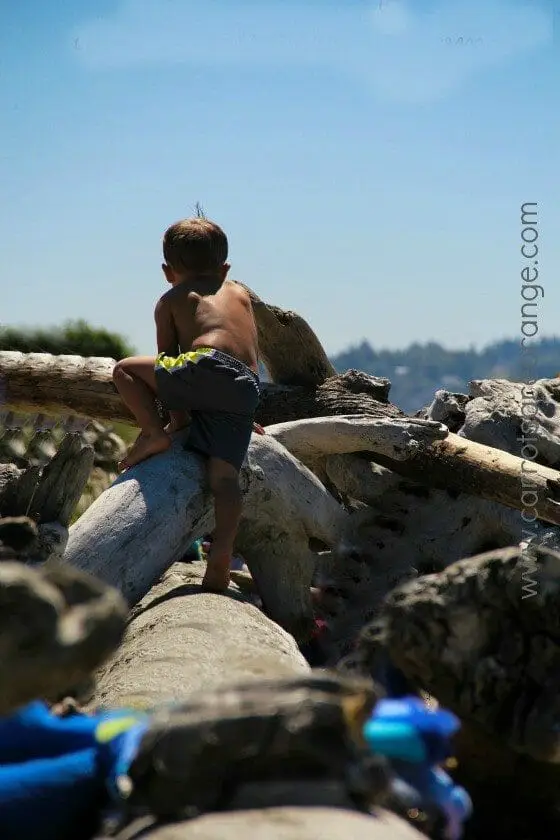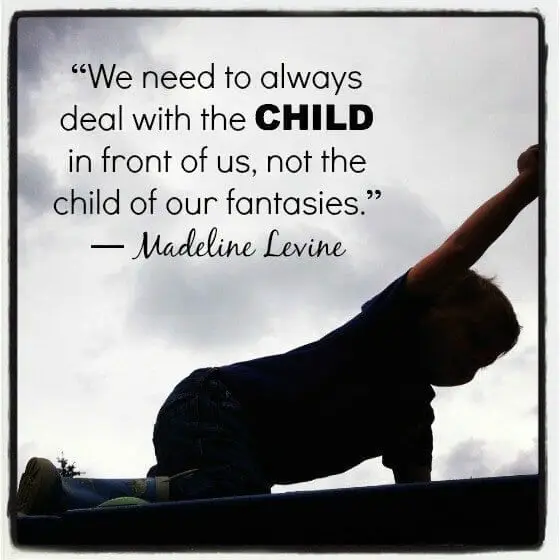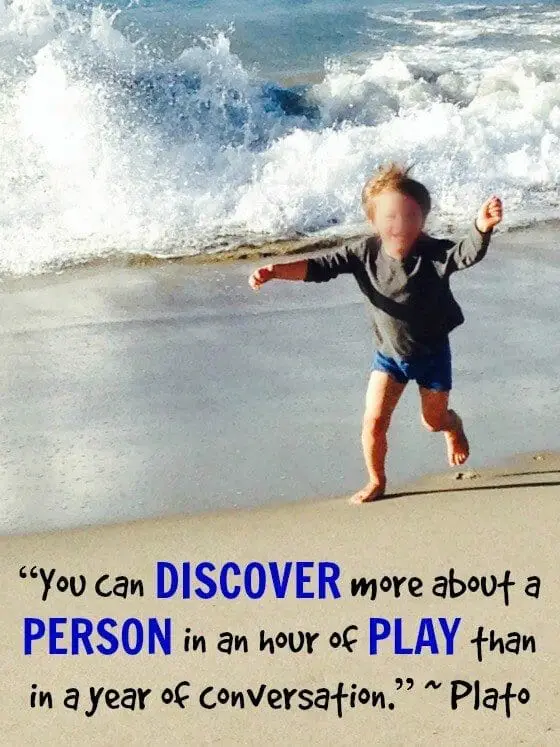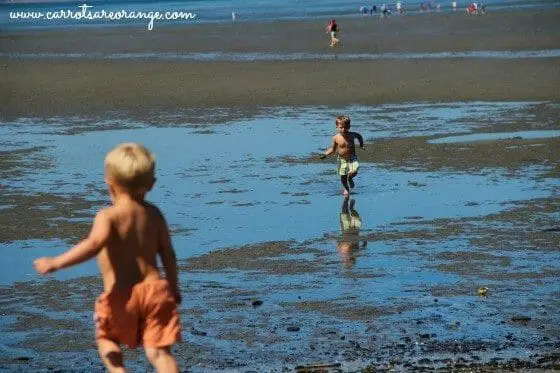This post includes thoughts on What to Know about Child Development. A friend recently suggested I read Madeline Levine. Levine is a well know PhD who has written a book called Teach Your Children Well on raising children “for authentic success” as opposed to purely academic success. She has also written a book called The Price of Privilege
, which asserts that children today are generally disconnected and unhappy because of parental pressures and materialism. One of my main goals as a parent is for my boys to grow up learning how “to do”, in other words, how to be resourceful in their approach to life.
My goals in early education are to help my children develop a strong and secure sense of self, to have purpose in life, be prepared for life (not simply school) to be independent, resourceful and confident. Then, as they grow older, their choices in life with school and life's work will ultimately make them happier, right?
[Tweet “What to Know about Child Development “]
I am currently reading Madeline Levine's book Teach Your Children Well. The premise of this book is to give parents guidance on how to help their children be socially and emotionally intelligent, to accept many views of what it means to be smart, to embrace failure as part of a learning and life process, to be resilient and resourceful in their every day lives. She discusses all ages up to high school, and offers research based ideas and pragmatic approach for parents. I have explored the elementary school years. Below I share the highlights only. I highly, highly recommend purchasing Teach Your Children Well
and The Price of Privilege
for your home library.

[Tweet “”Our care of the children should be governed not by the desire to ‘make them learn things', but by the endeavor always to keep burning within them the light which is called intelligence.” ~ Dr. Montessori”]
What to Know about Child Development
Here are a few high level points (Levine coins the phrase “tasks of the elementary years”) I've taken from this excellent, highly recommended book thus far:
Learning to Make and to Be Friends
So long are the days when geography and parent friendship drives a child's circle of friends. This one is about the developmental shift from “Wanna play?” to “Why would I want to play with Joe? or Why would Joe want to play with me?” During the earlier years, parents have the opportunity to guide the child with much less at stake.
- Use “reflective messages” with children. I have had to use this one a lot lately for personal reasons. It has worked wonders: “How do you think she felt when you didn't say hello to her when she came over to our home?”
- Acknowledge feelings of social discomfort. Don't downplay them with words like “Come on, it is no big deal. You're at the same school, just a different classroom.
- Facilitate your child finding an area of acceptance. If he loves chess, then find a out of school program where he can find peers with a similar interest that may not be as readily accepted at school.
- Model! Model! Model the behavior!

Keep Learning Alive After Mastery Occurs
In Montessori land, a well known mantra is that a child will repeat a task endless simply for the repetition, and even when that child masters the task, he will not grow tired of it with his competence. As a child enters elementary years, the challenge itself is less motivating and less able to engage a child. Therefore a child becomes less likely to persist and to become an expert. There are many reasons for this occurrence, beyond brain development. For example, learning suddenly becomes less fun, children begin to see themselves relative to their peers, and, well, good old standardized testing ruins them. The idea that intelligence comes in many forms and that being smart isn't defined as the child who aces his math tests. ‘t what can parents do to mitigate these circumstances?
- Question the term “smart” with children. If your child says, “Joe is really smart,” ask a question like “In what way is Joe smart?” So a child will begin to see that being smart comes in many different forms.
- Keep learning alive! Young children are easily captivated with the world around them. Creating a sense of awe and wonder is actually quite easy. As your children grow older, adults have to stay curious about the world with the child. Within this context, I can't help but think of this quote from Rachel Carson:
- “If a child is to keep his inborn sense of wonder, he needs the companionship of at least one adult who can share it, rediscovering with him the joy, excitement, and mystery of the world we live in.”
- Encourage Questions. Don't simply provide answers. Show the child how to get the answer.
- Value academic risk-tasking. For our family the idea of risk-tasking extends across all areas of life. Sometimes we have to do hard things and we fall down. When we get up from that fall, we have learned a great deal of information. If a child feels open to taking risks he will enjoy learning and taking on challenge more than a child who is protected from risk and failure.
- Make Nature a part of your every day routine. Getting out into nature inspires and motives most of us human beings. Nature is certainly my muse. Getting children outside stimulates their curiosity and questions of the world.
Developing an Identity and a Sense of Self
Thinking about who you are changes dramatically during the transition from preschool into elementary and then throughout the elementary years. At first the preschooler is positive and excited, then elementary introduces the “relative to peers” syndrome and finally in high school a child can think about himself in a more complex logical way versus his peers. I already see this happening with my almost five year old. A few months back he “didn't need to take violin lessons because he already knew how to play.” That thinking went away as he began to learn his friends were taking violin. He couldn't understand why they went to lessons every week. So what can I do as a parent to guide my child into his discovery of who he is and then to accept that person?
- Empathy is a big one at this stage. Children are ready to respond and to understand this piece of emotional intelligence. At the end of the day, I want my boys to be kind, good people. I want them to be happy too, of course, but being “smart” doesn't fall at the top of my list, or anywhere on my list, actually. If I can guide them to being socially and emotionally intelligent, capable, resourceful, independent individuals, I believe the “smart” thing will fall into place. Don't forget to provide many opportunities to practice empathy.
- Emphasize goodness as often as possible with phrases such as “I noticed you helped your brother zip up his coat. That was very kind of you.” or “I noticed how you listen very well to your soccer coach at practice today.”
- Point out impact of behavior with questions such as “how do you think your brother felt when you called him ‘stupid'?” or “How would you feel if Joe took your legos away while you were still building?” or on the positive side, “I noticed you held the door for that elderly man coming out from the pool. That was very kind of you. How do you think it made him feel? How did you feel?”
- Emphasize effort with phrases such as “I love watching you put a puzzle together with your brother. You work together to build that really difficult puzzle.” or “I love watching you work hard at swimming class.”
- Don't be afraid to talk about moral issues. It may not seem like it but we have loads of opportunities every day to discuss moral issues with our children. Children “get it” a lot more when the topic is relevant to them, too. So, if they ask a question about the homeless man on the side of the road begging for money or food: “why is he so dirty? why wouldn't he take our apple, mom?” You may not always be ready for the questions but invite them and use them as an opportunity to openly discuss life's big issues. Often children's questions are insightful and will help guide the conversation!

Remembering to Play
I know I don't have to write much about this hot, trendy topic. Putting pressure on children to learn academically too early in life is actually detrimental to their brain development and overall well being. Many of my friends caught up in the frenzy of academic success complain that there aren't enough hours in the day, EVEN FOR THEIR KINDERGARTENER, for play. So, what can we do?
- Put away your devices. As hard as this one is for most of us, the effect is remarkable. Suddenly you have time you didn't realize you had and you have focus and energy to do the things you've been meaning to do for a while. For children, that means play.
- Keep toys simple. Don't buy into the “educational toy” line. Sticks are a “toy” as are rocks and grass and many other natural, every day items.
- Plan less activities. Signing up for all the amazing offering that exist in today's world is irresistible. I know, I am right there with you. Saying “no” and making space to do “nothing” is so powerful and will trump over planning your child's days any day of the week.
- Play with them. Yes! Hop on that trampoline! Build with those legos! Color along side them! Adults love to play just as much as children. We just let it go a long time ago. Let's be honest, we're all children at heart. So, put away your devices and play with your children. My husband is a champ at this one. Me, not so much. I have to work at it, every day.
I hope you found these highlights interesting. I highly encourage you to check out her books – Teach Your Children Well and The Price of Privilege
– in full detail. Levine's reads are worth your time and your money.
Enjoy!
Marnie

